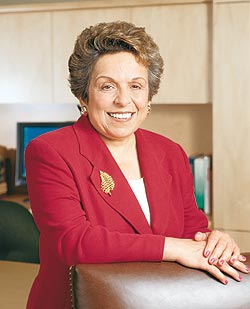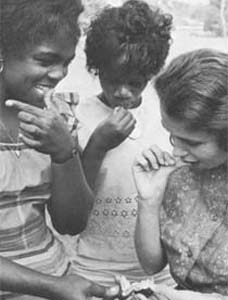
Donna Shalala has embarked on one of the most aggressive expansions in the history of the University of Miami, saying the school and the region need to grow together
University of Miami propels the economy
Donna Shalala has embarked on one of the most aggressive expansions in the history of the University of Miami, saying the school and the region need to grow together.
BY GREGG FIELDS
gfields@herald.com
Whether it's plotting to get the University of Miami's scientific research to market -- and create new jobs in the process -- or pondering a new urban mixed-use community around the Jackson Memorial medical complex, Donna Shalala has propelled UM into an aggressive expansion phase.
Symbolized by a $1 billion fundraising drive that is 80 percent completed, UM is cementing its role as a driver of the South Florida economy.
The school's importance to the community will grow, says the university president, as the region builds its profile in areas like biosciences.
Q: How important is UM as an economic engine? What are some of your building and development plans?
A: I believe it's a powerful economic engine. We contribute $3 billion to the state economy. Our faculty, staff, our residents and our students spend over $1 billion in Miami-Dade alone. That results in a spinoff to thousands of local companies and businesses.
We're the sixth-largest employer in Miami-Dade, the largest private sector enterprise. Our expenditures generate 26,000 jobs. One of every 28 jobs in Miami-Dade is supported by the University of Miami.
The economic impact on the city of Coral Gables alone is $1.1 billion. We have 10,000 employees in Coral Gables.
The first big development for us is down at the Medical Center, the Civic Center development we're doing with the mayor. We're not doing the private development; private developers are doing that.
Our second big development is out near the zoo, where we own a very large tract of land. We intend to build one of those new communities that Liz Plater-Zyberk, the dean of our architecture school, designs. It will be a walkable community. And we're very excited about it, and the county commissioners are very excited about it.
For the first time, we're going to build some faculty residences on campus, rentals. And we're going to build some faculty housing on the Smathers property in Pinecrest. These are putting housing residences on the tax rolls and trying to keep more people in Miami-Dade, particularly our employees.
I'd like to keep more teachers and fire and police officers in the city.
We're going to become a more residential campus. We're going to build a lot of housing for students over the next year. We've broken ground for the 800-student complex University Village. The business school is going to try a new concept of residences on top of an academic building.
And, of course, we've got the Orange Bowl renovation coming up. I never intended to leave. Everybody kept talking to me and I'd say, `Forget it, I love the neighborhood.'
Q: Describe the student body.
A: Our student population is 15,000, 9,000 of those are undergraduates. The population has remained steady over the last 10 years. The freshman class had an average GPA of 4.0. We had 17,000 applications for 2,000 slots.
We maintain a diverse enrollment that is unbelievable, including students from 110 countries.
About 80 percent of our students get some type of financial aid. That's probably 20 percent higher than any other institution with our academic profile, which means we have a lot of poor, smart kids. People look at our ethnic mix, and say, ''No, you can't be that good.'' But that also means that our students tend to be a little poorer. I spend a lot of time raising scholarships. I personally give a scholarship to the university.
We just got two gifts at the end of the year for medical school scholarships -- where the burden is really heavy -- of $5 million each. So we have a new $10 million endowment for medical school scholarships.
If you can be diverse, and be first-class and be a huge private employer and bring money to the tax base of Miami-Dade, this university is a treasure for South Florida. I believe we're treated that way. I have never been in a university in a city that was better liked and respected than the University of Miami. People in our community love the University of Miami, and it's not just the football team, and the basketball team.
Simultaneously, we've rapidly improved the quality of the student body. We've jumped 100 points on SATs. Kids who got scholarships last year can't get in this year. A lot of our alums are moaning and groaning they couldn't get in. I probably couldn't get in.
Q: In some cities, university research spawns economic development by spinoff companies. What is happening at UM in this regard?
A: I think we have a very good opportunity here, and the new grant from the Coulter Foundation is exactly what that's about: Take university scientists' work and basically get it to market, a translational research center, to go from basic research to testing.
Sometimes we just sell the license. But we're going to try to generate jobs, too. We're in the process of thinking about whether we should actually build, with a private developer, an incubator building. Incubator buildings are office buildings where small companies can get startup services.
Q: What is your management style? How does a president of an organization as large as UM know what's going on? What motivates you?
A: You know what? If what I wanted to do [was] all about the money, I could make a lot more money in the private sector. The reason I'm here is because I love the students and I love universities.
I'm as much a leaderstrategist as I am a manager. I only have a handful of people that report directly to me, though I work with all the deans on their strategies. I actually see the athletic director on a regular basis.
But I also get around. Because of e-mail, students have direct access to me, and so do lots of other people.
Q: How do you build a research university? How important is fundraising?
A: First, you have to have a great community that people want to live in. It's not the scientists who make the decision they want to move, but their families. You have to be able to attract their family. When we recruited a great scientist from the University of Rochester when I was first coming, a cancer scientist, the key for him happened to be schools. He was an Orthodox Jew, and he was particularly interested in high schools, and Miami-Dade happened to have five [that fit the bill]. And I happened to know that.
The key to building a great research university is not simply the facility. It's a sharp eye for developing groups of scientists that relate to each other and being able to offer them the packages. With an English professor it takes one letter with three paragraphs. With a scientist, it's probably 100 pages.
We announced a $1 billion campaign. We reported that we have raised over $800 million. I would love to finish the campaign in a year; it will probably take us two.
Everybody thought I was nuts. I thought that we needed to ask and to run a very good campaign. But after 9/11, everyone was skittish. Everybody said things that I thought were quite racist, like Hispanics don't give. And that simply is not true.
It does us no good to have a great research university if our community doesn't get better at the same time. The key to South Florida is quality jobs. There are jobs here; it's quality jobs for our highly educated people.
Kids that come to the University of Miami from Iowa want to live here forever. It's not just the kids from Miami that want to stay in Miami.








